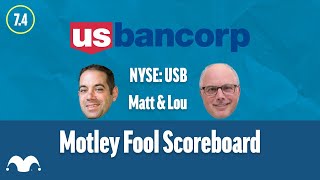What happened
Shares of U.S. Bancorp (USB +2.24%) dropped 10.2% in January, according to data provided by S&P Global Market Intelligence, after the large U.S. lender reported subpar year-end results. U.S. Bancorp tends to trade at a premium valuation to other bank stocks, and its latest results led to questions from investors about whether that premium is justified.
So what
U.S. Bancorp on Jan. 15 reported fourth-quarter earnings of $0.90 per share on revenue of $5.67 billion, short of analyst expectations of $1.09 per share in earnings on revenue of $5.8 billion. The quarter contained $272 million worth of what the bank called "notable items" including restructuring charges, but even after ignoring those one-time items, the results were still a penny shy of expectations.

Image source: Getty Images.
Average total loans grew by 0.8% from the third quarter, and average total deposits were up 1.9% sequentially and up 6.6% year over year. The bank said that net income fell due to an 8.2% increase in noninterest expense, and a 2.3% decrease in net interest income as declining short-term interest rates took their toll.
A good number of bank stocks fell in January, with uncertainty over the impact of the coronavirus on the global economy weighing on markets, but U.S. Bancorp's decline outpaced that of most other major banks.
Now what
U.S. Bancorp's results weren't terrible, but they were weak in areas including net interest income and flat in areas including merchant processing services and deposit service charges. The issue is that U.S. Bancorp posted a quarter that was average at best, and investors have come to expect more from the company.
Even after the January decline. U.S. Bancorp still trades at more than 13 times earnings, a premium to rivals JPMorgan Chase (12.8 times), Bank of America (12.6 times), and Wells Fargo (11.9 times).
Lackluster performance coupled with a premium valuation is a surefire way to get investors looking elsewhere. In January, that meant money moving away from U.S. Bancorp.






